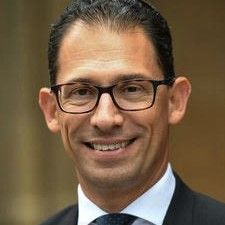
Bigotry anywhere is a grave injustice, yet it becomes all the more real to me when I hear about antisemitism in Sweden.
This nation, which was a respite for thousands of Jewish refugees shortly after World War II, eventually became a symbol of humanism and hospitality. Among those saved were my paternal grandparents, who arrived in Malmö aided by Count Folke Bernadotte, the Swedish diplomat who co-chaired the Red Cross. As was often the case with Holocaust survivors, my grandparents soon began to rebuild their shattered lives after their arrival, and in 1946, they welcomed Chaim, my father, into the world.
In 1969, Sweden was again a safe haven for my family. My mother, Dora, a 19-year-old Polish student of chemistry at the University of Wrocław, immigrated to escape a further wave of antisemitism.
And today, my extended family still lives in Malmö — Sweden’s third-largest city — and sees it as their home.
While I now reside in the United States, I will always feel indebted to Sweden. However, I find myself now heartbroken because Malmö, whose Jewish community dates back to the 17th century, has of late become associated not with tolerance but with antisemitism, specifically motivated by hatred towards Israel.
Unfortunately, numerous physical and verbal attacks against Jews have occurred, in addition to several pro-Palestinian demonstrations that have featured overt antisemitism. In December 2017, for example, several hundred people marched through Malmö shouting: “We have announced the intifada from Malmö. We want our freedom back, and we will shoot the Jews.”
Ilmar Reepalu, who served as the city’s mayor from 1994 to 2013, essentially accused the Jewish community of generating hatred, arguing that it did not distance itself clearly enough from Israel. Can you imagine a politician blaming any other group for the hatred they experience?
I, for one, cannot.
Fortunately, the current leadership of Malmö strikes a different tone. In 2021, the city hosted the Malmö Forum on Holocaust Remembrance and Combating Antisemitism, which I proudly attended in my professional role for the World Jewish Congress. At that time, the international community made specific commitments to counter Holocaust denial and distortion, as well as to fight antisemitism.
Current Malmö Mayor Katrin Stjernfeldt Jammeh has worked closely with the local Jewish community to combat antisemitism, including appointing a special coordinator. She also has entered into an agreement with the Jewish community to jointly strengthen public knowledge about Jewish life and history, as a manner of countering antisemitism and reducing the community’s vulnerability. She embodies the need for government and Jewish communal officials to collaborate, and I hope to see these initiatives flourish under her leadership.
Also under Stjernfeldt Jammeh’s stewardship, the city’s coordinator against antisemitism, Mirjam Katzin, last month published a second report about the Malmö Jewish community and its perception of local challenges. While the qualitative report concluded that Jewish residents of Malmö face hatred against Jews, particularly in times of growing tensions in the Middle East, several Jewish Malmö residents also shared that they had an “optimistic view of the situation.” In other words, the Jewish community wants to counter antisemitism, but does not view it as the defining factor of Jewish life and identity in Malmö.
Positively featuring Jewish life and culture in the public square would strengthen the connection between the city and its Jewish citizens, according to the respondents. Just as essential, it would help to educate the community at large about the need for Jews to enjoy a proud and public Jewish identity, critical in curtailing growth of the world’s oldest hatred.
In other words, the Jewish community of Malmö is sophisticated in its interests and nuanced in its complexity and needs to work alongside the Malmö government in jointly developing a deepened and accessible sense of Jewish pride. Already, the city has partnered with the Jewish community to open a Jewish Knowledge Center in the city’s synagogue, to improve awareness of the Jewish national minority in schools and to develop meaningful interfaith efforts, among other outcomes.
At the same time, Swedish leaders must be clear and consistent in their immediate and forceful condemnation of threats against their Jewish citizens, whatever the source or motivation.
Finally, Jewish life anywhere, especially in a city as rich in Jewish history as Malmö, must not be reduced to a chronicle of persecution, as in the case of my own family before their arrival in Sweden. Instead, coordinated actions against antisemitism, combined with efforts to strengthen Jewish identity and the community’s understanding of the Jewish people, will serve as a model for other locales and safeguard Jews not only in Malmö, but elsewhere around the globe.
Daniel Radomski is the head of strategy and programs for the World Jewish Congress and executive director of its Jewish Diplomatic Corps. He grew up in Malmö, Sweden.






